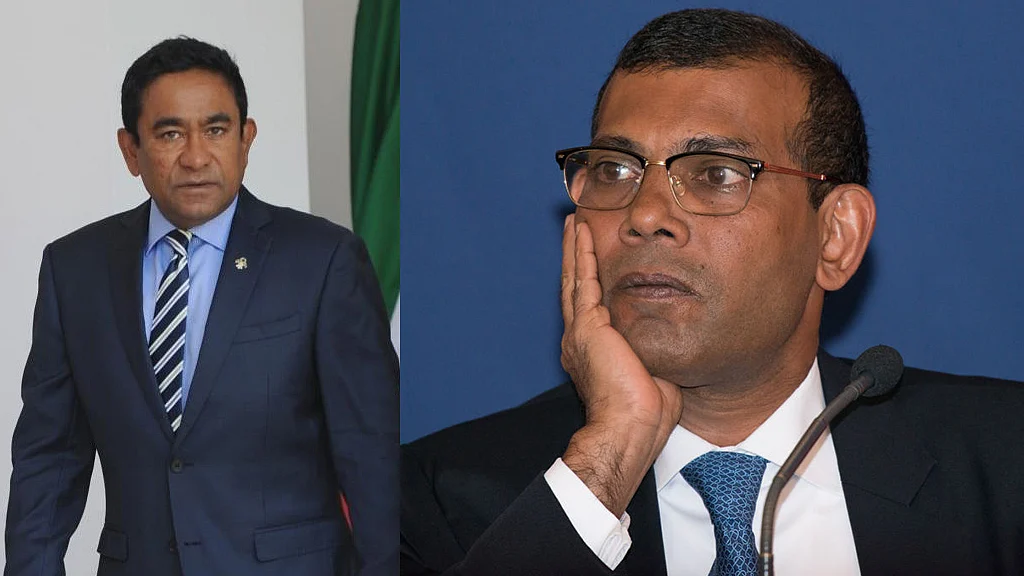Emergency in Maldives—Chief Justice, former President arrested; India, China issue travel advisories
Maldivian President Abdulla Yameen refuses to implement Supreme Court order to release political prisoners including the first democratically elected president, Mohamed Nasheed; declares emergency

After repeated rounds of clashes between police and opposition protesters, Maldivian President Abdulla Yameen Abdul Gayoom on Monday night declared a state of emergency for 15 days amid the ongoing political crisis in the country, reported the Chinese government’s press agency Xinhua. The state of emergency gives security officials extra powers to arrest suspects, the BBC reported. The government has already suspended Parliament and ordered the army to resist any moves by the Supreme Court to impeach the President. Attorney General Mohamed Anil said that any move to unseat the President would be "unconstitutional", as the President can be ousted only through a vote in Parliament and that police and security forces would not obey an impeachment order from an "illegitimate set of people".
Also on Monday night, two Supreme Court judges including the Chief Justice of Maldives were arrested. President Yameen’s half brother, former President Maumoon Abdul Gayoom was also arrested on charges of bribery and attempting to overthrow the government.
Unrest in Maldives unleashed by Govt refusal to implement Supreme Court order
Maldives has been facing days of unrest after the Supreme Court issued a ruling last week to release top opposition political leaders, including former President Mohamed Nasheed—Maldives' first democratically-elected President and an Amnesty International Prisoner of Conscience—and former Vice President Ahmed Adeeb. The court said their trials were "politically influenced" and that they must be freed until fair trials could be conducted without undue influence.
India had said it was imperative for all organs of the Government of Maldives to respect and abide by the order of the Supreme Court of Maldives releasing all political prisoners, in the spirit of democracy and rule of law.
Nasheed, who took office in 2008 and was ousted in a coup in February 2012, welcomed the order. The country has seen political unrest since he was sentenced to 13 years in jail in 2015 on terrorism charges. He was given political asylum in the UK in 2016. In a tweet following the Supreme Court's ruling, Nasheed called on Gayoom to resign. A similar call was echoed in a joint statement by the country's opposition parties.
However, President Yameen asked the Supreme Court to revoke its decision and the government has so far refused to implement the order, saying it had concerns about releasing those who were convicted for "terrorism, graft, embezzlement and treason". It said it had been advised by the Chief Justice to follow "due process in releasing the detainees". The government said that the Prosecutor General had informed the top court about the "legal challenges" in the implementation of the ruling.
In response, the court issued a second order on Sunday stating "there was no legal barrier to implementing its decision" and that "the order must be implemented".
Faced with no option but to release his political opponents, and with his presidency undermined, embattled President Yameen instead decided to crack down, through a 15-day Emergency.
US tells Yameen "the world is watching”; China, India issue travel advisories
The United States reacted immediately, demanding that the Maldivian government and military respect the rule of law, freedom of expression and democratic institutions, adding that the world is watching. The White House National Security Council also expressed solidarity with the people of Maldives. US Ambassador Atul Keshap spoke with the Chief Justice to state the US position that any “robust democracy requires a judiciary which functions without hindrance or intimidation”.
India had earlier expressed hope that the safety and security of Indian expatriates in Maldives would be ensured by the Maldivian authorities under all circumstances. This has now been upgraded to an advisory to defer non-essential travel to the Maldives.
China on Monday told its citizens not to visit the Maldives until normalcy returns. China had signed a free trade accord with Maldives last year that was rushed through the Maldives Parliament without any debate and had left India concerned. In wake of this, Chinese Foreign Ministry spokesperson Geng Shuang said: "We require the Maldives to take necessary measures to earnestly protect the security of the Chinese enterprises and their personnel."
With IANS inputs.
Follow us on: Facebook, Twitter, Google News, Instagram
Join our official telegram channel (@nationalherald) and stay updated with the latest headlines
- China
- Emergency
- United States
- Maldives
- President Abdulla Yameen
- Maldives Parliament
- Maldives army
- Maldives Supreme Court
- President Mohamed Nasheed
- Vice President Ahmed Adeeb
- Maldives Chief Justice
- President Maumoon Abdul Gayoom
- Maldives Attorney General
- Mohamed Anil
- US ambassador Atul Keshap
- travel advisory